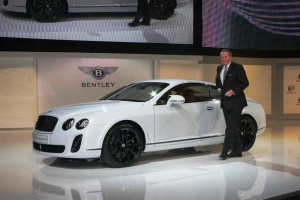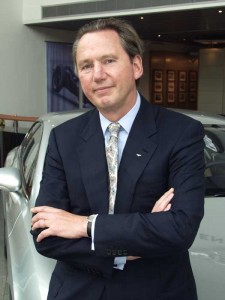
Bentley CEO Franz-Josef Paefgen helps introduce the new Continental Supersports, the automaker's most powerful model ever, at the Geneva Motor Show, earlier this month.
He carries himself with a quiet regalness that almost doesn’t belong in the eat-or-be-eaten automotive world. But don’t let that fool you. Franz-Josef Paefgen is one tough businessman. And under his guidance, the British maker Bentley, the top-line subsidiary of Germany’s Volkswagen AG, has been radically transformed from an industry also-ran to the world’s best-selling ultra-luxury marque.
But times have changed fast, in the current economy. Bentley’s global sales fell 24% last year, and the market continues to weaken — something unusual, as luxury products traditionally hold up better than more mainstream vehicles. To find out what’s happening with Bentley, as well as the even more exclusive Bugatti brand — which Paefgen also heads — TheDetroitBureau.com caught up with the German executive after the press days were over at the Geneva Motor Show.
TDB: How bad is the current automotive downturn?
Paefgen: I think it’s the headline for the car business is, “a lack of confidence.” Everybody is totally confused about what’s going to happen. If you are not sure what is happening with your income, your pension, your assets, you’re not thinking about spending money.
TDB: There seem to be all sorts of reasons why luxury sales are so badly off: some because potential buyers are watching their stocks and bonds collapse, some because their home values are off and they can’t access equity lines, still others because they don’t want to be seen spending on a Bentley when their company is laying off.
Paefgen: It’s like a tsunami. Left and right, you see people being swamped, so the last thing you do is stop to buy an ice cream. You start running as fast as you can to find a high and dry point to wait until the situation is over. As soon as we see the banks send a more positive message, I think we will see things change, but right now, when you open the paper, every morning, and you see the headlines, you wonder, “where is my money.” This is not the right mood to be saying, “What a nice Bentley.”

After a record 2007, Bentley sales slid 24% last year, and Paefgen is taking steps to survive even a 50% slump.
TDB: You sold 7,604 cars last year, compared with a record of 10,000 or so, in 2007, a record. Where you surprised by the depth of that slide?
Paefgen: No, we’ve been seeing signs, since 2007, when we started shifting production from the U.S. to (emerging markets like) Russia. But the real downturn began in September, when the world market was down 16%, then 20% in October, and it’s been 25% every month since them. What’s interesting is that everybody is now affected, including Russia, and even China. The whole car industry is affected.
TDB: How is that affecting Bentley, which has seen such huge growth, in recent years?
Paefgen: We set a goal for ourselves that even at 50% (decline in) production, we would still be able to break even. That is our emergency plan. We are heavily restructuring the company. Everything is being streamlined – except engineering, which is pulling projects forward. We have cut the night shift. Our policy, at Bentley, is to build one car less than the market demands. We will have all our 2009 models done by June and then begin the 2010s.
TDB: Did I hear right? You’re speeding up engineering on new products?
Paefgen: Pulling forward. All engineering, we’re trying to pull forward because a new product is easier to sell. We’re trying to do it with the same amount of money. That means everybody in the company is being paid 10% less, including myself. If this has a positive outcome, we’ll probably have a bonus and pay everybody back. So we think we’re safe for the next 18 to 24 months.
TDB: Let’s talk product for the moment. You’ve just introduced the new Continental Supersports, your most powerful model ever. How many do you plan to build?
Paefgen: There is no number, right now. We are making plans quarter by quarter. The first quarter is de-stocking, the second is look-and-see, and we’re hoping the third quarter brings a little upturn.
TDB: The Supersports is being billed as the “greenest” Bentley, but much of that is based on its using E85 bio-fuel, rather than making a huge reduction in its overall fuel consumption. Aren’t you being a little misleading?
Paefgen: People look at these electric vehicle fleets, but if you get energy from a power station running on dirty fuel, you could be producing 165 grams of CO2 per mile, while a diesel car is producing 90 grams. Where is the advantage? We need to shift attention to what we’re actually doing and a gram of CO2 is a gram of CO2 and you have to look at wells-to-wheels. (Where calculations consider everything from what’s used to produce the fuel to the emissions that come out of the tailpipe.) In the U.S., new regulations require a big increase in the production of ethanol, and that means using a lot more E85.
TDB: Let’s turn to Bugatti. You just introduced the Centenare, at the Geneva Motor Show, a limited edition of one.
Paefgen: This is the first step in celebrating 100 years of Bugatti, and it was proposed by a customer who is going to buy the car. We’ll have more later this year.
TDB: How much is he going to pay for Centenare?
Paefgen: I can only tell you the base price, $1.2 million.
TDB: There had been stories indicating we might see a less expensive Bugatti, in the future.
Paefgen: The simple story is that we will stay where we are, at the very top of the market. As soon as this car stops, we will build something else. We’re in the last 50 or so of the Veyron Coupe, then we have 150 (convertibles). Then we need to find something else to fill the plant. We’re currently running at the rate of 65 cars a year, so that means 2.5 to 3 years, at the latest.
TDB: We’ll start to show a proposal in September, when you’ll see four one-offs with the theme of racing history.
